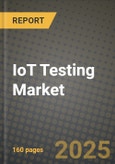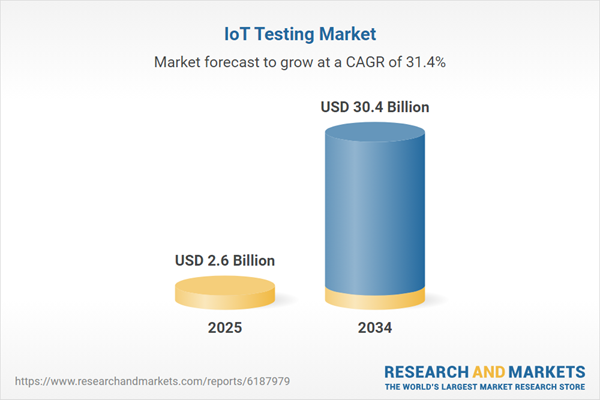The IoT Testing Market focuses on validating the performance, functionality, security, and interoperability of Internet of Things (IoT) devices, platforms, and ecosystems. As IoT deployments become more complex, involving billions of interconnected sensors, networks, and applications, robust testing becomes essential to ensure quality, scalability, and resilience. IoT testing spans a wide range of domains - device testing, network simulation, software verification, real-time analytics, security testing, and usability validation. It enables businesses to identify defects, optimize performance, and mitigate vulnerabilities before deployment. Testing is especially critical in mission-critical sectors such as healthcare, automotive, manufacturing, and smart infrastructure, where failure can lead to safety hazards or service disruptions.
The IoT testing market gained momentum due to increased regulatory scrutiny and demand for more reliable and secure deployments. Enterprises implemented end-to-end test frameworks that included hardware-in-the-loop (HIL) simulation, protocol conformance testing, and automated regression testing across IoT stacks. Companies such as Keysight Technologies, Spirent, and Capgemini expanded their IoT testing offerings with integrated platforms supporting 5G, LPWAN, and edge computing scenarios. Cybersecurity testing, including penetration testing and data integrity validation, became a top priority, especially in sectors like smart energy and connected vehicles. Organizations also sought real-time analytics during testing phases to simulate operational environments and generate actionable insights faster. Testing-as-a-service (TaaS) models gained traction, particularly among SMEs that needed scalable, outsourced testing capabilities.
The IoT testing will become increasingly AI-driven, automated, and integrated into continuous deployment workflows. Testing platforms will incorporate machine learning to predict defects, auto-generate test cases, and analyze real-world telemetry for performance benchmarking. Digital twins will be used to simulate system behavior in real-time environments, allowing proactive testing and validation under different load conditions. With the rise of edge computing and decentralized architectures, testing strategies will need to cover both centralized and distributed system performance. Cybersecurity testing will expand to include quantum resilience and supply chain integrity. As global standards evolve, compliance testing will become a key service offering. Overall, IoT testing will evolve into a continuous quality assurance engine that supports the fast-paced, iterative development of secure and scalable connected ecosystems.
Key Insights: IoT Testing Market
- The analyst highlights the adoption of AI-powered testing platforms that automatically generate and execute test cases, analyze telemetry data, and predict system behavior under different conditions to accelerate time-to-market.
- Cybersecurity-focused testing is trending, with organizations validating IoT systems for vulnerabilities in firmware, communication protocols, and data integrity before mass deployment to prevent breaches.
- According to the analyst, testing for interoperability and scalability is gaining attention as devices from multiple vendors must function cohesively within multi-cloud, multi-protocol environments.
- The use of digital twins in testing is increasing, enabling developers to simulate complex IoT environments and evaluate system responses to different operational scenarios before real-world implementation.
- Testing-as-a-Service (TaaS) models are trending, offering scalable, cloud-based testing environments that reduce the need for in-house infrastructure while enabling continuous and remote validation.
- The analyst identifies the increasing complexity of IoT ecosystems - featuring multiple layers of hardware, software, and connectivity - as a primary driver for structured, comprehensive testing solutions to ensure system robustness.
- Rising adoption of connected devices in critical sectors like healthcare, automotive, and utilities is pushing the need for rigorous quality assurance and validation to ensure safety, says the analyst.
- The analyst notes that the shift toward agile and DevOps methodologies is encouraging enterprises to embed automated IoT testing into CI/CD pipelines for continuous validation during development cycles.
- Regulatory compliance and industry standards - such as GDPR, HIPAA, and ISO/IEC protocols - are compelling businesses to implement formal testing for privacy, performance, and system compatibility.
- The analyst highlights the difficulty in replicating real-world scenarios across diverse IoT environments during testing, which can result in incomplete coverage or missed edge-case defects after deployment.
- According to the analyst, the lack of standardized testing frameworks across industries and protocols poses a challenge, requiring businesses to invest in custom or fragmented test tools and processes.
IoT Testing Market Segmentation
By Testing Type
- Functional Testing
- Usability Testing
- Security Testing
- Compatibility Testing
- Performance Testing
- Network Testing
By Testing Tools
- Software Tools
- Hardware Tools
By Applications
- Connected Cars
- Smart Appliances
- Smart Energy Meters
- Wearable Devices
- Smart Healthcare Devices
Key Companies Analysed
- AT&T Inc.
- Huawei Technologies Co. Ltd.
- Siemens AG
- Intel Corporation
- International Business Machines Corporation
- Cisco Systems Inc.
- Verizon Enterprises Solutions LLC
- HP Enterprise Company LLC
- Infineon Technologies AG
- Fortinet Inc.
- Symantec Corporation
- Gemalto NV
- ARM Holdings plc
- Check Point Software Technologies Ltd.
- PTC Inc.
- Alcatel-Lucent SA
- Forgerock Inc.
- Trustwave Holdings Inc.
- NSIDE Secure Inc.
- Allot Communications Ltd.
- Armis Inc.
- Sophos Group plc
- Broadcom Inc.
- Wurldtech Security Inc.
- Centri Security Inc.
- SecuriThings
- Mocana Corporation
- Newsky Security Inc.
- Axeda Machine Cloud LLC
- NETCOM On-Line Communication Services Inc.
- Palo Alto Networks Inc.
- Rapid7 Inc.
- SimpliSafe Inc.
- Cradlepoint Inc.
- SonicWall Inc.
- Medigate Corporation
- CyberMDX Healthcare Cybersecurity
- Entrust Datacard Corporation
- Microsoft Corporation
- Amazon Web Services
- Google LLC
- Ericsson AB
- Thales Group
- Atos SE
IoT Testing Market Analytics
The report employs rigorous tools, including Porter’s Five Forces, value chain mapping, and scenario-based modeling, to assess supply-demand dynamics. Cross-sector influences from parent, derived, and substitute markets are evaluated to identify risks and opportunities. Trade and pricing analytics provide an up-to-date view of international flows, including leading exporters, importers, and regional price trends.Macroeconomic indicators, policy frameworks such as carbon pricing and energy security strategies, and evolving consumer behavior are considered in forecasting scenarios. Recent deal flows, partnerships, and technology innovations are incorporated to assess their impact on future market performance.
IoT Testing Market Competitive Intelligence
The competitive landscape is mapped through proprietary frameworks, profiling leading companies with details on business models, product portfolios, financial performance, and strategic initiatives. Key developments such as mergers & acquisitions, technology collaborations, investment inflows, and regional expansions are analyzed for their competitive impact. The report also identifies emerging players and innovative startups contributing to market disruption.Regional insights highlight the most promising investment destinations, regulatory landscapes, and evolving partnerships across energy and industrial corridors.
Countries Covered
- North America - IoT Testing market data and outlook to 2034
- United States
- Canada
- Mexico
- Europe - IoT Testing market data and outlook to 2034
- Germany
- United Kingdom
- France
- Italy
- Spain
- BeNeLux
- Russia
- Sweden
- Asia-Pacific - IoT Testing market data and outlook to 2034
- China
- Japan
- India
- South Korea
- Australia
- Indonesia
- Malaysia
- Vietnam
- Middle East and Africa - IoT Testing market data and outlook to 2034
- Saudi Arabia
- South Africa
- Iran
- UAE
- Egypt
- South and Central America - IoT Testing market data and outlook to 2034
- Brazil
- Argentina
- Chile
- Peru
Research Methodology
This study combines primary inputs from industry experts across the IoT Testing value chain with secondary data from associations, government publications, trade databases, and company disclosures. Proprietary modeling techniques, including data triangulation, statistical correlation, and scenario planning, are applied to deliver reliable market sizing and forecasting.Key Questions Addressed
- What is the current and forecast market size of the IoT Testing industry at global, regional, and country levels?
- Which types, applications, and technologies present the highest growth potential?
- How are supply chains adapting to geopolitical and economic shocks?
- What role do policy frameworks, trade flows, and sustainability targets play in shaping demand?
- Who are the leading players, and how are their strategies evolving in the face of global uncertainty?
- Which regional “hotspots” and customer segments will outpace the market, and what go-to-market and partnership models best support entry and expansion?
- Where are the most investable opportunities - across technology roadmaps, sustainability-linked innovation, and M&A - and what is the best segment to invest over the next 3-5 years?
Your Key Takeaways from the IoT Testing Market Report
- Global IoT Testing market size and growth projections (CAGR), 2024-2034
- Impact of Russia-Ukraine, Israel-Palestine, and Hamas conflicts on IoT Testing trade, costs, and supply chains
- IoT Testing market size, share, and outlook across 5 regions and 27 countries, 2023-2034
- IoT Testing market size, CAGR, and market share of key products, applications, and end-user verticals, 2023-2034
- Short- and long-term IoT Testing market trends, drivers, restraints, and opportunities
- Porter’s Five Forces analysis, technological developments, and IoT Testing supply chain analysis
- IoT Testing trade analysis, IoT Testing market price analysis, and IoT Testing supply/demand dynamics
- Profiles of 5 leading companies - overview, key strategies, financials, and products
- Latest IoT Testing market news and developments
Additional Support
With the purchase of this report, you will receive:- An updated PDF report and an MS Excel data workbook containing all market tables and figures for easy analysis.
- 7-day post-sale analyst support for clarifications and in-scope supplementary data, ensuring the deliverable aligns precisely with your requirements.
- Complimentary report update to incorporate the latest available data and the impact of recent market developments.
This product will be delivered within 1-3 business days.
Table of Contents
Companies Mentioned
- AT&T Inc.
- Huawei Technologies Co. Ltd.
- Siemens AG
- Intel Corporation
- International Business Machines Corporation
- Cisco Systems Inc.
- Verizon Enterprises Solutions LLC
- HP Enterprise Company LLC
- Infineon Technologies AG
- Fortinet Inc.
- Symantec Corporation
- Gemalto NV
- ARM Holdings PLC
- Check Point Software Technologies Ltd.
- PTC Inc.
- Alcatel-Lucent SA
- Forgerock Inc.
- Trustwave Holdings Inc.
- NSIDE Secure Inc.
- Allot Communications Ltd.
- Armis Inc.
- Sophos Group PLC
- Broadcom Inc.
- Wurldtech Security Inc.
- Centri Security Inc.
- SecuriThings
- Mocana Corporation
- Newsky Security Inc.
- Axeda Machine Cloud LLC
- NETCOM On-Line Communication Services Inc.
- Palo Alto Networks Inc.
- Rapid7 Inc.
- SimpliSafe Inc.
- Cradlepoint Inc.
- SonicWall Inc.
- Medigate Corporation
- CyberMDX Healthcare Cybersecurity
- Entrust Datacard Corporation
- Microsoft Corporation
- Amazon Web Services
- Google LLC
- Ericsson AB
- Thales Group
- Atos SE
Table Information
| Report Attribute | Details |
|---|---|
| No. of Pages | 160 |
| Published | October 2025 |
| Forecast Period | 2025 - 2034 |
| Estimated Market Value ( USD | $ 2.6 Billion |
| Forecasted Market Value ( USD | $ 30.4 Billion |
| Compound Annual Growth Rate | 31.4% |
| Regions Covered | Global |
| No. of Companies Mentioned | 44 |









